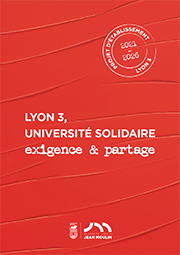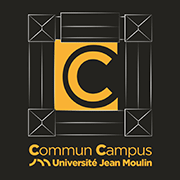AccueilRechercheProgrammes et productions scientifiquesThèsesThèses soutenuesThèses soutenues - 2006-2021Thèses soutenues - 2019
-
Partager cette page
- Recherche,
TILLOI D'AMBROSI Dimitri
Cuisine et diététique à Rome : IIIe siècle av. J.-C. – IVe siècleap. J.-C.
Publié le 9 juillet 2019 – Mis à jour le 13 juin 2022
Thèse en Lettres et Civilisation Antiques, soutenue le 8 juillet 2019.
L’historiographie de l’alimentation dans le monde romain a connu ces dernières années un développement considérable. Parmi la multitude de domaines qu’elle recouvre, la médecine représente un vaste champ à explorer tant les interactions avec le monde des cuisiniers sont importantes. La diététique antique s’intéresse de près au choix des aliments, à leur préparation et aux modalités de leur consommation. L’héritage d’Hippocrate dans ce domaine est largement repris par Galien ainsi que par d’autres médecins, encyclopédistes et moralistes d’époque impériale. L’un des enjeux de cette étude est d’abord de définir la meilleure fa?on de cuisiner et de manger sain pour la médecine, après avoir envisagé les hiérarchies alimentaires de la diététique. L’analyse des critères de choix de la nourriture, des règles pour la cuisiner, du go?t qui en résulte doit permettre de mieux comprendre dans quelle mesure la cuisine définie par les médecins correspond à celle appréciée par les gourmets. Le croisement des sources médicales avec les sources littéraires de natures variées (satiriques, romanesques, épistolaires, biographiques) conduira ensuite à évaluer le degré de pénétration des principes de la diététique dans les mentalités et dans les pratiques alimentaires au sein de la société romaine. Les différentes étapes du repas romain peuvent être analysées à la lumière des textes médicaux pour déceler l’influence de l’enseignement des médecins. Au-delà des enjeux diététiques, manger sain relève d’enjeux moraux, culturels et sociaux qu’il convient d’analyser pour déterminer l’articulation entre l’idéal de l’homme romain et le comportement alimentaire. Néanmoins, cuisiner et manger sain dans l’Empire romain n’est pas univoque. Il convient d’envisager également la diversité géographique et sociale par le biais des différentes sources. Les attitudes face aux contraintes du régime peuvent également être contrastées et conduire à la transgression des normes élaborées par la diététique.
This thesis is about Food and Medicine in Ancient Rome. Food has been a more and more important matter of study for a couple of years. The aristocratic banquet is very often the main point of attention of historians, ancient texts are above all dealing with the upper classes of society. Some aspects like the values of the banquet and sociability, or the composition of the meals, are highlighted. But one domain is very often left aside : the links between food and medicine. Medical treatises are very interesting to study because food is one of the most important aspects of ancient medicine. Dietetics is considered as one of the three main fields of ancient medicine with surgery and pharmacology. Dietetics doesn’t include just food but it is more generally the way of life, and also involves physical exercices for example or sleep. Food, indeed, can be considered as a medicine and a way to protect health and to prevent illness. The most important author on this subject is Galen, a famous doctor from the 2nd century AD, who follows the Hippocratic tradition, but other doctors from the Roman period also have to be considered like Oribasius or Anthimus who lived during the Late Antiquity. Medical theories from Antiquity are well known and studied, so it would be interesting to determine how they can impact food preparation and consumption, but also how ancient recipes could influence medical prescriptions. Medical treatises, texts containing references to food, but also archaeology have to be compared, to see if populations during the Roman Empire respected these prescriptions when they ate. This work will try to show if we can observe an impact on the population’s habits and health, and finally if we can speak of a dietary awareness.
Mots-clés : Alimentation ; Pratiques alimentaires ; Empire Romain ; Médecine ; Diététique ; Santé ; cuisine ; gastronomie.
Keywords : Food History ; Banquet ; Dietetics ; Medicine ; Food ; Diet ; Roman Empire.
Directrice de thèse : Bernadette CABOURET LAURIOUX
Membres du jury :
- Madame Bernadette CABOURET-LAURIOUX, Directrice de thèse, Professeure des universités, Université Jean Moulin Lyon 3,
- Monsieur Christophe BADEL, Professeur des universités, Université de Haute Bretagne Rennes 2,
- Madame Véronique BOUDON-MILLOT, Directrice de recherche, Laboratoire Orient méditerranée, Université La Sorbonne Paris IV,
- Madame Isabelle BOEHM, Professeure des universités, Université Lumière Lyon 2,
- Monsieur John WILKINS, Professeur émérite, Université Exeter,
- Madame Marilyn NICOUD, Professeure des universités, Université d’Avignon.
Président(e) du jury : Isabelle BOEHM
This thesis is about Food and Medicine in Ancient Rome. Food has been a more and more important matter of study for a couple of years. The aristocratic banquet is very often the main point of attention of historians, ancient texts are above all dealing with the upper classes of society. Some aspects like the values of the banquet and sociability, or the composition of the meals, are highlighted. But one domain is very often left aside : the links between food and medicine. Medical treatises are very interesting to study because food is one of the most important aspects of ancient medicine. Dietetics is considered as one of the three main fields of ancient medicine with surgery and pharmacology. Dietetics doesn’t include just food but it is more generally the way of life, and also involves physical exercices for example or sleep. Food, indeed, can be considered as a medicine and a way to protect health and to prevent illness. The most important author on this subject is Galen, a famous doctor from the 2nd century AD, who follows the Hippocratic tradition, but other doctors from the Roman period also have to be considered like Oribasius or Anthimus who lived during the Late Antiquity. Medical theories from Antiquity are well known and studied, so it would be interesting to determine how they can impact food preparation and consumption, but also how ancient recipes could influence medical prescriptions. Medical treatises, texts containing references to food, but also archaeology have to be compared, to see if populations during the Roman Empire respected these prescriptions when they ate. This work will try to show if we can observe an impact on the population’s habits and health, and finally if we can speak of a dietary awareness.
Mots-clés : Alimentation ; Pratiques alimentaires ; Empire Romain ; Médecine ; Diététique ; Santé ; cuisine ; gastronomie.
Keywords : Food History ; Banquet ; Dietetics ; Medicine ; Food ; Diet ; Roman Empire.
Directrice de thèse : Bernadette CABOURET LAURIOUX
Membres du jury :
- Madame Bernadette CABOURET-LAURIOUX, Directrice de thèse, Professeure des universités, Université Jean Moulin Lyon 3,
- Monsieur Christophe BADEL, Professeur des universités, Université de Haute Bretagne Rennes 2,
- Madame Véronique BOUDON-MILLOT, Directrice de recherche, Laboratoire Orient méditerranée, Université La Sorbonne Paris IV,
- Madame Isabelle BOEHM, Professeure des universités, Université Lumière Lyon 2,
- Monsieur John WILKINS, Professeur émérite, Université Exeter,
- Madame Marilyn NICOUD, Professeure des universités, Université d’Avignon.
Président(e) du jury : Isabelle BOEHM
Documentation
Mise à jour : 13 juin 2022







